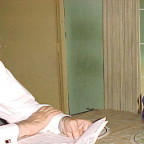(Interview published in Indian Express 28 Feb 1998)
Shihab Thangal: The healer-in-chief, the supreme guide, the most reverent counselor, the wisest of men… In him merge the secrets of ancestry and the exigencies of realpolitik, the mandate of faith and the burden of power. His official designation, the State president of IUML (Indian Union Muslim League), is an understatement.
And the House of Thangal in Panakkad is a statement of submission and salvation. He has just returned from a campaign tour in Thiruvananthapuram. Complaints, doubts, pain, disputes, worried matrimony and controlled faith are multiplying in the courtyard. He sits behind a table with scattered papers and soiled currency notes. The pen achieves a perfect harmony with the gold-rimmed glasses of Thangal.
Then Thangal listens to quiet whispers and tearful anxieties of the pilgrims – old women in purdah, young wives with tired children and thin travelers covered with dust. His words are salvation. And he rises from his seat to inaugurate a new jeep. Thangal sits on the passenger’s seat, his eyes break the glass shield and travel to the end of the horizon. The camera clicks. The driver turns the key.
Thangal retreats from the Thangal-struck. Entry to this drawing room is restricted to select visitors. In this spartan space, the only diversion is an aquarium of three fish.
The monosyllabic movement of Thangal’s lips is almost as quiet as the aquatic rhythm in the glass box. Thangal on social reform: “Malabar Muslims are not so backward. We have schools with the agenda of reformation”. Thangal on the issue of Muslims as the victims of Muslim leaders: “That happens only in north India”.
And Thangal is the only man in Muslim League who doesn’t have to contest an election to remain the paramount leader of the League. The party has two Lok Sabha seats both in Kerala. Bombay’s Banatwala reaches Parliament through Ponnani in Malabar. The nationalism of Muslim League is another word for the sub rural backwardness of Malappuram. Or, it is as remote as Panakkad. Its author is a man who has the mandate of a million hearts. One of the most powerful men in political Islam lives in the periphery of a State where Muslims constitute a meager 20 per cent of the population.
Thangal’s power is spiritual, ancestral and political. It started five generations ago, when the first Thangals landed in Valapattanam from Yemen. They traveled to Calicut, then to Malappuram, as learned men of healing. And it was a saga of sacrifice and endurance. “In the early ’20s, my great grandfather was banished by the British”. Shihab Thangal inherited the spiritual as well as the political mantle of the Thangal magic from his late father, Syed Ahmed Pookoya Thangal. But this Thangal, now washed in pre-inaugural cologne, has seen the world beyond Malappuram. “For eight years from 1958, I studied at the Cairo University”.
The rustle of salvation grows in the courtyard. And Shihab Thangal has to go. Bakeries are waiting. Jewelleries are waiting. Candidates are waiting. You take leave, thank him for the rarest of bananas he offered, for that tea flavored with the finest spices of Malabar. The House of Thangal, as Alavi, for forty years the manager of ceremony here, says, is an open house. And this house has reduced the distance between religion and politics. The IUML is a party of permanent power, and Thangal knows that power alone ensures the relevance of his party.
Panakkad Shihab Thangal is power. The air released from his mouth livens the soiled reputation of League politics in Kerala.




12 comments
shihab thangal is the messenger of allah.
shihab thangal is the mahima of malabar.
Oru chiri kond Lokam keeyhadakkan kayhiyum enkil ath Shihab Thangalk sadikkumayirunnu
Sayyid Muhammadali shihab thangal India,ude Athmavu Kanda Mahananu.Thangalude vakkukal maanava samoohathinu kulir mazhayayirunnu.Matha maithriyum samaadanavum kaathu sookshicha “AMBASSIDOR OF PEACE AND LOVE.HE IS NOT ONLY MAHATHMA OF MALABAR BUT ALSO MAHATHMA OF INDIA”
enikku ende makande kudumbajeevidhathil oru prasnam undayappol ende nenjil valathu kai vechittu ennodu paranju athoru sounnarya pinakkamanu marumakal veettil thirichu varumennu aa samayam marumakal case kodithirunnu paranjadhupole falichu marumakal thirike vannu case ende veettil ninnukondu avalude uppayum ummayum koody poyi pinvalichu ennavar sugamayi jeevikkummnnu alhamdulillah
If thangal would have been with US. Angayude orma thanne samadanamanu.Ningal njangalude Muthu aanu.WIll miss u.
Allahu nammaleyum, thangaleyum jannathil orumichu koottatte
We love him.. A gr8 man. Gr8 leader. Gr8 scholar.
We are blessed coz we saw Shihab Thangal, we live with him and he prayed for us.
I respected him
Very very… Important person
I just taking these words “The mahatma of Malabar”
inna lillahi vahinnailaihi rajihoon
A GREAT LOSS FOR ALL.
SHIHAB THANGAL KNOWN THE MAHATHMA OF KERALA &MORE OVER IN KERALA HE IS THE SARVAMATHA SAMMATHAN &ENTHO ELLAVARKUM ISHTAMANU THANGALE